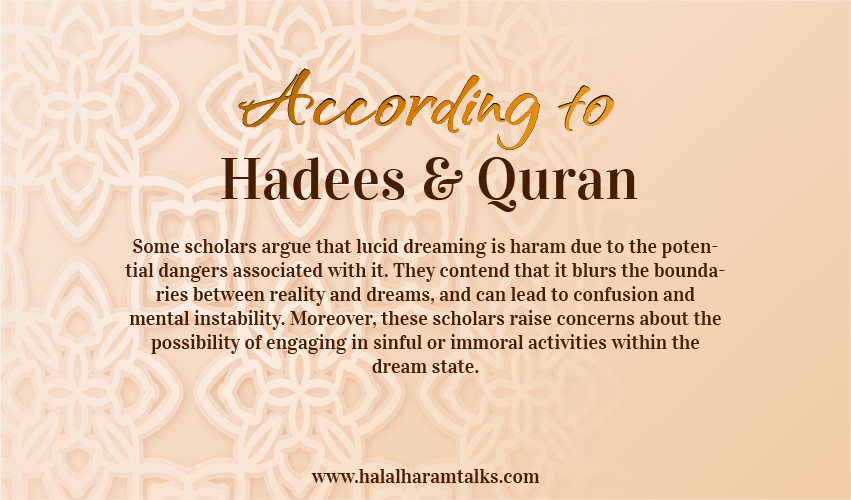In the realm of human experience, dreams have always held a mysterious allure. The concept of lucid dreaming, where one becomes aware and in control of their dreams, has captivated the curiosity of many individuals. However, for those adhering to the Islamic faith, the question arises: is lucid dreaming haram or allowed within the scope of Islamic principles? This article aims to shed light on this topic by exploring different perspectives, examining relevant Quranic verses and hadiths, and presenting arguments from both sides.
Lucid dreaming refers to the state in which an individual realizes that they are dreaming and can consciously navigate and manipulate their dream world. It offers an extraordinary experience where one can explore their subconscious mind, conquer fears, and even enhance creativity. However, as with any matter within the Islamic framework, its permissibility or prohibition hinges on the teachings and guidance derived from the Quran and prophetic traditions.
This article seeks to present a balanced view on the subject, acknowledging both perspectives and providing information to help individuals make their own informed decisions. Exploring the viewpoints on whether lucid dreaming is permissible or forbidden in Islam, we will analyze the potential reasons put forth by scholars from either side. Moreover, we will examine the Quranic references to dreams, as well as the hadiths related to dream interpretation, to gain insight into the Islamic perspective on the matter. By delving into these aspects, we aim to provide clarity and a deeper understanding of the topic at hand.
Is Lucid Dreaming Haram
Lucid dreaming, a concept that has fascinated humans for centuries, is the ability to be aware and in control of your dreams. It allows individuals to consciously navigate through the dream world and manipulate their dreamscape. However, the question arises: is lucid dreaming haram (forbidden) in Islam? In this article, we will explore the various perspectives on this matter. And delve into religious references to shed light on the topic.
For more: Is It Haram To Cut Nails At Night
Why Is Lucid Dreaming Haram or Halal
The permissibility of lucid dreaming can be seen from two different perspectives: one claims it is haram. While the other states it is halal (permissible) in Islam. Let’s delve into each perspective to gain a better understanding:
- Some scholars argue that lucid dreaming is haram due to the potential dangers associated with it. They contend that it blurs the boundaries between reality and dreams, and can lead to confusion and mental instability. Moreover, these scholars raise concerns about the possibility of engaging in sinful or immoral activities within the dream state.
- On the other hand, proponents argue that lucid dreaming is permissible in Islam. They believe that since dreams are part of human nature and occur involuntarily, being aware and in control of them should not be considered haram. As long as the content of the dream and the actions taken within it do not contradict Islamic principles and teachings. It is deemed permissible.

Is lucid dreaming haram?
The question of whether lucid dreaming is haram ultimately depends on one’s interpretation and understanding of Islamic teachings. While some argue it is forbidden due to potential negative consequences, others view it as permissible as long as it aligns with Islamic principles and doesn’t lead to any sinful actions.
For more: Is Lottery Haram
Is Lucid Dreaming Haram or Halal?
Lucid dreaming can be seen as both haram and halal depending on the individual’s perspective. It is important to exercise caution and self-control while engaging in lucid dreaming, ensuring that the content and actions remain within the boundaries set by Islam.
For more: Is Drop Shipping Haram
Is Luminous Dreaming Haram?
Lucid dreaming and luminous dreaming are terms used interchangeably to describe the same phenomenon. Therefore, the permissibility or prohibition of lucid dreaming applies to luminous dreaming as well.
For more: Is Music Haram
Is Lustrous Dreaming Haram?
Similar to the previous question, lustrous dreaming is another term used to refer to lucid dreaming. Hence, the discussions and perspectives surrounding the permissibility of lucid dreaming apply equally to lustrous dreaming.
For more: Is It Haram To Have Crush
FAQs
The sinfulness of lucid dreaming depends on the actions taken within the dream. If those actions are in accordance with Islamic principles, there is no sin involved. However, if one engages in sinful or immoral activities within the dream state, it may be considered sinful.
Some scholars raise concerns about lucid dreaming causing confusion and mental instability. However, there is no scientific evidence to support this claim. Like any other activity, moderation and self-control are essential to ensure a healthy psychological state.
Islam does not provide specific guidelines for lucid dreaming. However, adhering to Islamic principles and avoiding immoral actions within the dream can serve as a general guideline to ensure that it remains within the boundaries of Islam.
Conclusion
Determining whether lucid dreaming is halal or haram in Islam requires critical analysis and an understanding of different scholarly perspectives. While some argue against it due to potential dangers and blurred reality. Others see it as a permissible act if it aligns with Islamic principles. It is important for individuals to educate themselves on the topic, and consult with scholars. And make informed decisions based on their own understanding of Islam.
To gain a deeper understanding of what is considered halal (permissible) and haram (forbidden) in Islam. It is recommended to explore the teachings of the Quran and Hadith, seek knowledge from reliable sources, and consult with knowledgeable scholars. By doing so, individuals can navigate their spiritual journey with clarity and make informed choices.
To continue learning about various aspects of Islamic teachings, halal, and haram, we invite you to visit our website. Our platform offers a wealth of information on Islamic principles and practices to help you further explore these subjects. May you find guidance and blessings in your pursuit of knowledge and adherence to the teachings of Islam.
